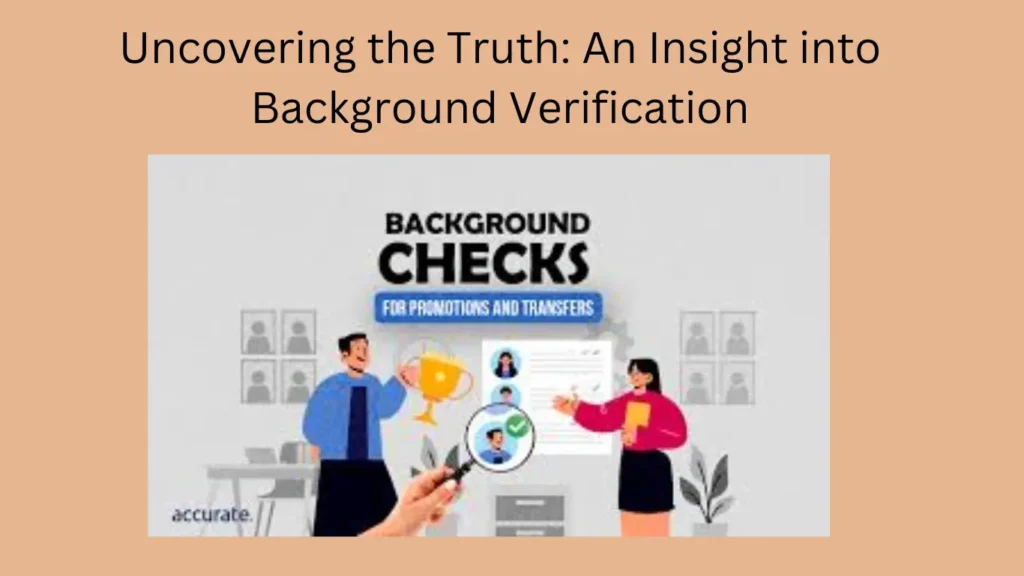Introduction
In today’s interconnected world, trust and safety are paramount. Whether it’s for employment, tenancy, or personal relationships, knowing the background of an individual is essential. Background verification serves as a crucial tool in this process, providing a comprehensive look into a person’s history to ensure reliability and security. This article delves into the importance of background verification, its key components, and how it benefits various sectors.
The Importance of Background Verification
Ensuring Workplace Safety
By verifying the history of potential employees, companies can prevent hiring individuals with violent or criminal pasts, thereby reducing risks of workplace violence and harassment.
Protecting Company Assets
Screening for past instances of fraud or theft ensures that only trustworthy individuals are brought on board, protecting the company’s interests.
Building Trust in Personal Interactions
In personal relationships, such as hiring a nanny or finding a roommate, background checks offer peace of mind. They provide assurance that the person is reliable and has no hidden past that could pose a threat.
Key Components of Background Verification
1. Identity Verification
- Ensuring the individual’s identity through documents like passports, driver’s licenses, or social security numbers.
2. Criminal Record Checks
- Searching for any past criminal activity that might indicate a potential risk.
3. Employment History Verification
- Confirming previous employment details to validate the candidate’s experience and qualifications.
4. Education Verification
- Checking the authenticity of educational qualifications to ensure credibility.
5. Credit History Checks
- Reviewing financial history, especially for roles involving financial responsibility, to assess trustworthiness.
Benefits of Background Verification
1. Reducing Negligent Hiring Risks
- Thorough background checks protect companies from legal liabilities associated with negligent hiring by demonstrating due diligence in the hiring process.
2. Enhancing Workplace Culture
- Employees feel safer and more secure knowing their colleagues have been properly vetted, which fosters a positive and trusting workplace environment.
3. Ensuring Regulatory Compliance
- Certain industries have legal requirements for background checks. Complying with these regulations not only ensures legal safety but also promotes higher safety standards.
Best Practices for Implementing Background Verification
1. Develop a Clear Policy
- Create a transparent background verification policy that outlines what will be checked, why, and how the information will be used. Ensure this policy is communicated clearly to all job applicants.
2. Obtain Consent
- Always obtain written consent from candidates before conducting background checks to ensure legal compliance and build trust.
3. Protect Privacy
- Handle all background check information confidentially and store it securely to protect candidates’ privacy.
Conclusion
Background verification is a vital tool for ensuring trust and safety in various aspects of life. Whether for employment, tenancy, or personal relationships, conducting thorough background checks can prevent potential risks and build a foundation of trust. By understanding and implementing effective background verification processes, organizations and individuals can make informed decisions that promote safety and reliability.
For further Inquires Contact Us
FAQs
1. Why is background verification important?
- Background verification ensures trust and safety by screening individuals for past criminal behavior, verifying qualifications, and protecting assets.
2. What does a comprehensive background check include?
- It includes identity verification, criminal record checks, employment history verification, education verification, and sometimes credit history checks.
3. How do background checks benefit employers?
- They help prevent negligent hiring, reduce workplace violence, protect company assets, and ensure regulatory compliance.
4. Are background checks legal?
- Yes, background checks are legal when conducted with the individual’s consent and in compliance with data protection and privacy laws.
5. How should background check information be handled?
- All information should be handled confidentially, stored securely, and only accessible to authorized personnel to protect privacy and comply with legal standards.
